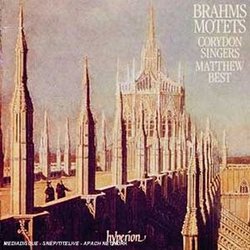ESSENTIAL BRAHMS
DAVID BRYSON | Glossop Derbyshire England | 01/11/2005
(4 out of 5 stars)
"There are various ways of anthologising Brahms's less-known choral pieces. The Kansas City Chorale focus on the works that are easier for a listener new to this kind of music, but include the two severe motets op 29: Herreweghe goes in at the severe end, giving us all three sets of motets though starting with the Festival and Commemoration Pieces op 109 which are unaccompanied but a little less forbidding than the motets may at first sound: this disc gives us everything that Herreweghe gives, and also includes the 3 unaccompanied Sacred Choruses op 37 plus three settings with organ accompaniment - the Hymn op 30, Psalm 13 op 27 and the Ave Maria op 12.
We will never really get to grips with Brahms or understand what he really amounts to, it seems to me, if we don't know the motets. These are no more compositions that can be written off as `academic' than Bach's motets are. They are abstruse music and they are abstract music, but they are also some of the loftiest and most serious music ever composed. The art of music itself was probably the nearest thing Brahms had to a religion, and he had been obsessed from childhood with the techniques and potential of the ancient schools, particularly the German tradition. The well-meaning liner-booklet with this disc does its best, but the signs of its author's bafflement are all too clear. He takes refuge in superficial descriptions of the academic devices used, and when it comes to Ach arme Welt he blurts out that `the human dimension seems strangely muted'. A human dimension in that sense is the wrong thing to be looking for, as it is the wrong thing to look for in Bach's Art of Fugue. Music can touch human emotions as powerfully as anything can, but there is more to it than just a human dimension.
I can recommend this disc thoroughly, even if I stop short of a fifth star. The warmer and more approachable works are very well and appealingly done, what is missing is something of the stern awe-inspiring quality that Herreweghe for one can invest the motets with, and the recording has a pretty formidable standard to measure up to these days. There is some relief from the austerity of the Herreweghe disc here, and for uncertain music-lovers this is probably a better place to make a start with such music. For those who are even more hesitant, the Kansas City disc is probably a better starting-off point still. In the last resort the motets are the key to my own belief that Brahms is far and away the greatest European composer born in the 19th century. By that I don't mean that it is impossible to understand him without knowing the motets, just that one hears the familiar masterpieces with different ears when one does.
There is no information regarding the performers in the liner-booklet, and although there is a fine picture of the roof of Milan cathedral I would have traded that for the identification of the organ used. Full texts are, however, supplied with translation."
Fantastic works by a choral master
kiwimuzo | Auckland, New Zealand | 05/24/2003
(4 out of 5 stars)
"Brahms sure knew how to write intricate and appealing choral music - his harmonies certainly set out to defy the idea that he was born into the wrong musical period and should have been a Classicist. If you've never experienced this sort of music before, do get hold of a score and sift through it while you listen - his genius will amaze you!This recording is what I'd call "safe" - it covers all the bases, is correct in terms of dynamics and intonation, but lacks the darker, more intense Germanity we might expect to hear. Still, there a precious few versions of this music around, and we could do a lot worse than this."


 Track Listings (16) - Disc #1
Track Listings (16) - Disc #1